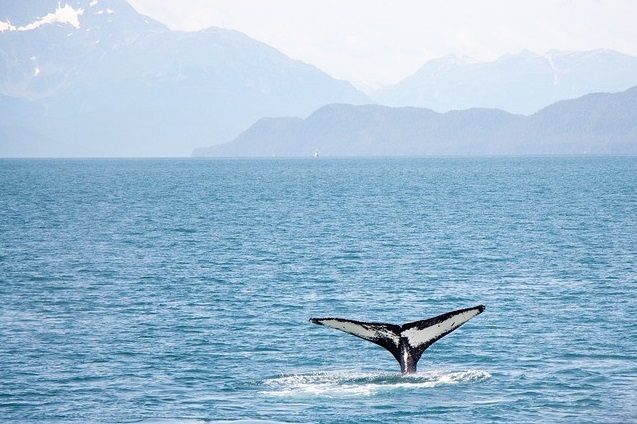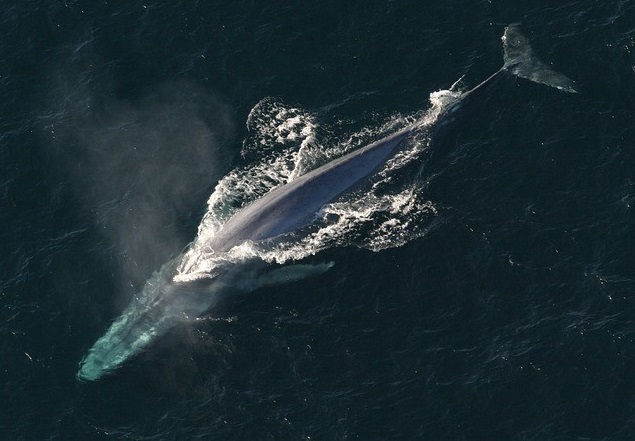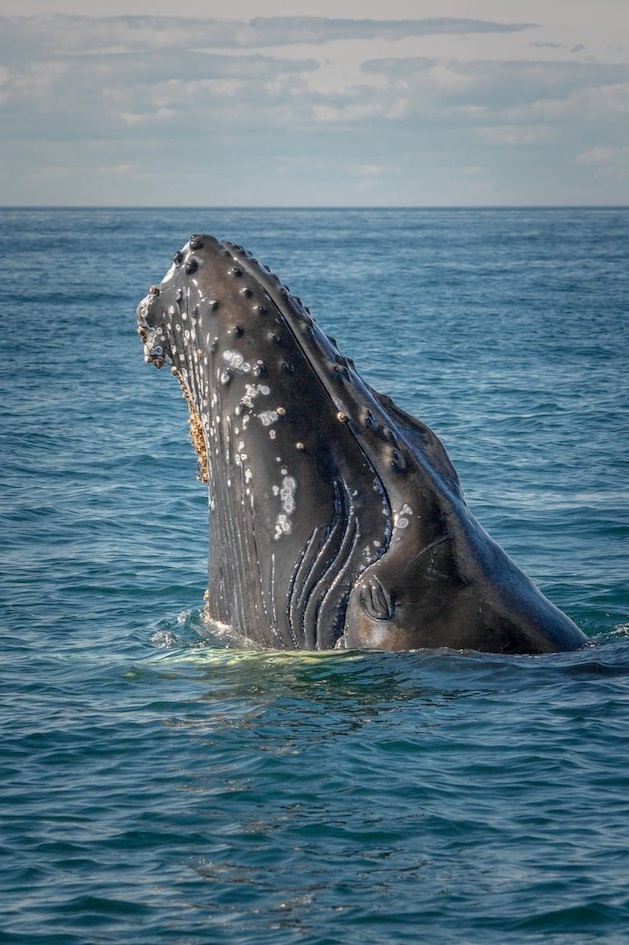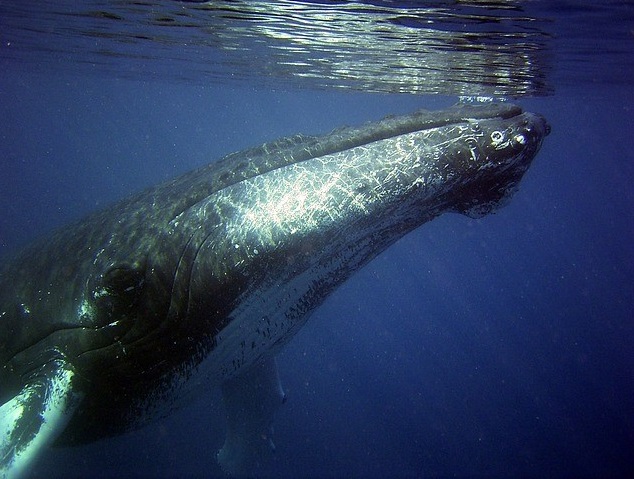Whale-watching excursions in Massachusetts last roughly four hours. The trip takes approximately an hour from most areas to a location where visitors can watch the whales feed.
Tour companies have an idea of where to see the marine life and essentially guarantee passengers will see the lovely creatures.
For lucky guests, you not only see these gigantic mammals but also get the pleasure of viewing harbor or gray seals, sea turtles, dolphins, and varied fish species, including tuna and bluefish. Where there are seals, you’re likely to find a shark lurking.
Usually, the boat will offer light appetizers with water or coffee on a tour. Many will allow guests to bring food and drinks as long as each person is responsible for their trash.
It’s essential to bring remedies for seasickness if you’re prone, and even if you’re not, sometimes the motion or staring into the horizon can bring symptoms.
An excellent accompaniment is ginger with adequate meds that don’t create drowsiness while on the journey.
Find out how to whale watch responsibly at https://www.nationalgeographic.com/travel/article/how-to-whale-watch-responsibly and then let’s look at the whale-watching experience more in-depth.
The Fundamentals Of Whale Watching In Massachusetts
The season for whale watching lasts from early May to the end of October. It’s suggested to, of course, invest in a good camera and bring binoculars. These will be handy when looking for sea life other than the massive whale. Ocean birds include Jaegers, Storm Petrels, and Shearwaters, along with many others.
It’s vital to ensure you go on a tour that follows sustainable whale-watching practices allowing safe and responsible viewing of sea creatures with stringent guidelines. You’ll find many tours with those leaving the north shore from Gloucester and Newburyport.
When heading out on your own, there are specific regulations to follow. You can find these on the site “See a Spout.” The following is an outline of some of the rules to follow:
- Boaters should avoid harassing or chasing after whales or other ocean creatures. It is against the law, with hefty fines for those failing to comply. Safe boating practices can be learned by visiting “See A Spout” or checking the New England marine life guidelines.
- Enlist someone as the whale watch to look out for mammals. The whales might not sense your presence when busy feeding, with the potential to come up directly in front of the boat. A promising sign of whales near the surface is birds hovering.
- Where whales populate the water, boaters are expected to maintain a slow speed. Where there is one, there’s the potential for others. Colliding with a boat can harm the whale with life-threatening consequences plus cause severe damage to the vessel.
- Litter or trash should be disposed of properly and not tossed overboard into the water, where it can be ingested by sea life. These items will harm the creatures.
Depending on where you go in Massachusetts, you’ll have the opportunity to see specific breeds of whales, including:
- Humpback
- Minke
- Finback
You’ll also possibly see white-sided dolphins, varied unusual ocean birds, sea turtles, sharks, seals, and on. When whale watching in Gloucester, the weather is varied and can go from raining steadily to beautiful sunshine in mere minutes. You’ll want to have a sack packed with necessities, including the following:
- Hat
- Sunglasses
- Binoculars
- Camera
- Raincoat
- Water/food or snacks
- Sweater or sweatshirt
- Comfortable outfit
- Sunscreen
If you don’t have food and drink, tour boats often have snacks and coffee or water for visitors. While the crew members are there to ensure the safety of everyone there, along with the sea animals, these professionals can also answer questions with much knowledge and expertise.
Most of the tours are accompanied by “New England Aquarium Naturalists,” all of whom have completed studies in each whale breed and much information about these, including their size details, food choices, and where they prefer to live.
Whale watching is not just an observation opportunity; it can be exceptionally educational and a good experience for adults and children. There would be specific safety guidelines when taking kids on this sort of excursion. Click for whale-watching tips.
What Are Some Suggestions When Going On The Boat Tour
The idea is to enjoy every moment of your whale-watching experience while mingling in the waters with these tremendous creatures. You don’t only want to see the massive beauty through the lens of a camera; it’s important to let it absorb into your own memory by watching it firsthand.
It’s suggested to snap the picture quickly, don’t worry about a super precise photo, and then wallow in the moment yourself. You might not get the experience of sailing with the whales again. Consider the following suggestions when taking one of the whale-watching tours.
· Allow exceptional patience instead of becoming easily frustrated
Whale behavior won’t be something anyone can necessarily predict. With experts on the tour, however, you will have the most gratifying experience. If anyone knows what to watch for to tell when a whale is close or near to the surface, these teams will be wise to those facts.
Tour operators are so sure of their expertise that they guarantee whale sighting while riding with their crew.
It’s suggested humpbacks will spend an average of “between 3 to 8 minutes chilling under the surface,” making it essential that tourists hang out and be patient until the whale feels like making its debut.
· Don’t try to lean overboard
Trying to “pet” the sea animals or swimming alongside them is prohibited. It’s critical to remain onboard and keep all extremities within the confines of the boat. The ocean creatures are wild. Tours aim to observe them in their natural habitat without disturbing them.
It’s for your own personal safety and the animals’ wellness that everyone takes part in responsible practices. Many local sites in Gloucester and surrounding areas are available for safe and ethical whale watching. It’s wise to watch videos from tour companies and read educational literature.
· Avoid feeding the whales
Being out in the water with the whales isn’t the same as being in the zoo. The sea creatures are wild and know how to fend for themself. They must be able to do so and continue to in the future. The last thing anyone wants is for the whales to grow dependent on the tours for their food supply.
What many people don’t consider is if these tours were to abruptly stop for any particular reason and the whales needed to rely on their own instincts again for collecting food, there could be dire consequences. Again, the tour is to pay attention to how they live and thrive in their environment independently.
· Study ahead of time to understand what it is you’re seeing
When you’re in Gloucester and the surrounding areas, you’ll have an idea of which breeds you might see and the other ocean creatures you could be exposed to, giving you the opportunity to research ahead of time to help you recognize what you’re witnessing.
You’ll have the advantage of knowing exactly which sort of whale you see when it pops up out of the water and may be able to tell if it’s playing, feeding, or just relaxing.
Stellwagen Bank In Massachusetts Prime Whale Watching Territory
The Stellwagen Sanctuary has been dubbed the premium location for whale watching in New England since this is where the humpback breed primarily goes to feed along the shallow waters. Learn about whale watching in Massachusetts at https://travelinginfocus.com/whale-watching-in-massachusetts/.
This is an ideal spot to see the mammals surfacing with depths of only approximately 100 feet allowing visitors to see whale activities like “lunge feeding, bubble net, breaching.” Tours are arranged out of Gloucester, Boston, and Provincetown, with all watches going to Stellwagen.
When taking a tour, suggestions from tour operators for the most thrilling experience and the best photo opportunities include the following:
· The reputation of the tour crew should be stellar
The crew you book the tour with should have a solid reputation in the Gloucester area. They must promote responsible whale watching and prioritize the passengers’ safety and security and the ocean creatures’ well-being.
Most reputable tour operators guarantee a whale sighting and supply a money-back guarantee or something comparable if guests don’t get the view while out on their excursion.
· Guests are encouraged to bring a sack with adequate supplies for optimum comfortability
The tour companies want passengers to be comfortable with each providing guidelines on what to include in a sack to ensure preparedness for virtually any situation. These include rain gear, non-slip rubber footwear, layers for warmth, sunscreen, and a hat to protect from the sun beating down.
· Seasickness is a possibility even for those not usually affected
Seasickness meds should be included in the sack, along with some ginger to aid the tablets, since the rough waters can induce motion sickness even for individuals not usually affected. Also, staring at the water or one location for a prolonged period can also bring on the sensation.
When out on the water, the sprawling expanse of the water is enough to make someone ill even when the day is calm. Taking the seasickness meds and/or ginger before heading out for the excursion is suggested. Here are some tips to keep you from getting seasick.
You should also check the forecast to see if the day holds rough conditions. The predictions aren’t always on point, but to avoid the potential for rocky weather, you can get the tickets on the same day instead of buying ahead and risking a bad experience.
· Binoculars will allow you to focus on more than whales
While whales are the trip’s primary focus, you’ll want to see what’s happening surrounding the creature. Maybe they’re spewing something out or playing with other ocean creatures around them, or unusual birds are fluttering in the air above them.
You want to take advantage of these things in addition to the central focus of the whale watching. The mammal is the primary reason for the trip, but there are so many other minute details you can miss if you don’t have the tools to look a little bit closer.
The experts might explain what’s happening, but wouldn’t you want to see it yourself?
Final Thought
Whales prefer colder waters like those found in Gloucester. No matter how long they need to travel, most tours will make their way to Stellwagen Bank, the sanctuary where whales find their greatest happiness feeding in the shallow waters, and you can see them near its surface.
The vital detail with whale watching is that you book with a tour group with a solid reputation prioritizing the safety of the passengers and the well-being of the whales and other ocean life. These crews will ensure you see the whales in their natural habitat but that the whales enjoy the experience too.











